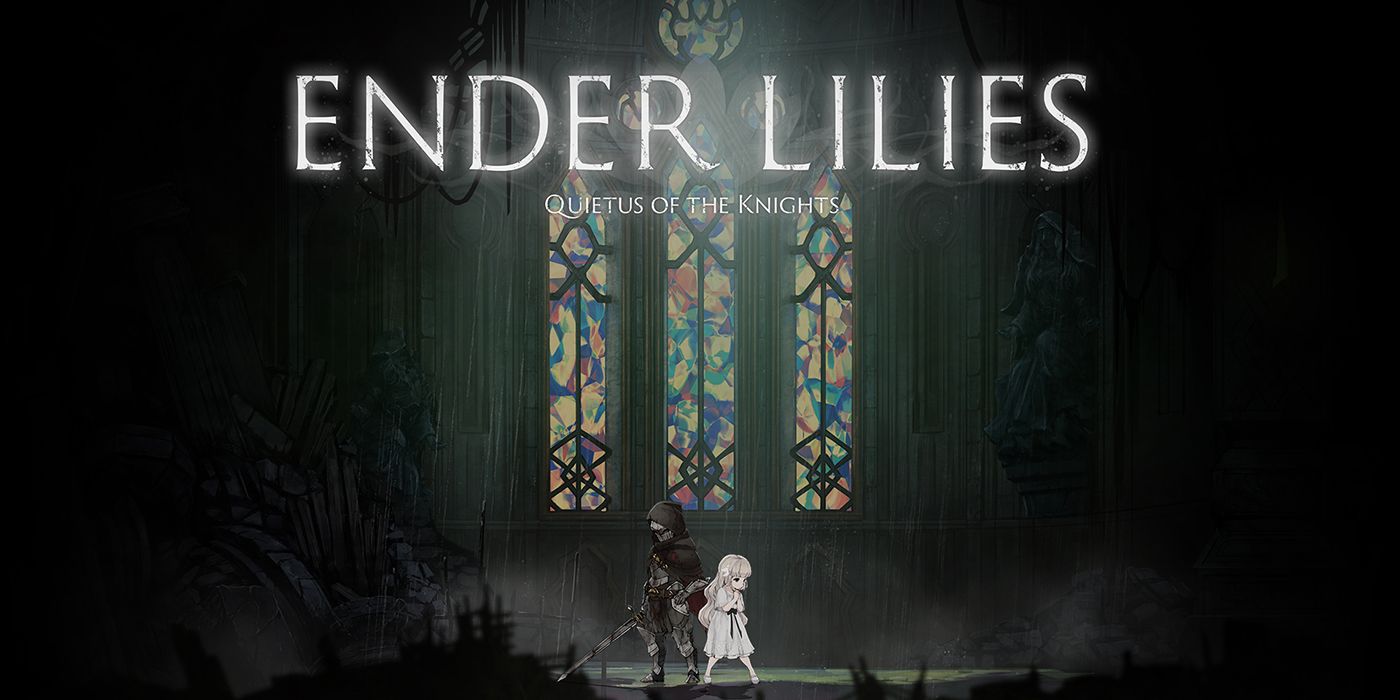
A small girl in white, Lily, awakens on a pedestal in a crumbling parish. With no memory of who she is or how she came to be there, the girl hears a disembodied voice inform her that she is a Priestess in a kingdom that has been destroyed by the Blight, a cursed rain that has turned the entire populace into deformed creatures. Thus begins Ender Lilies: Quietus of the Knights, developed by Adglobe and Live Wire.
First released on PC, Switch, and Xbox consoles before arriving on PlayStation nearly a month later, the dark fantasy platform game fits snugly into the Metroidvania subgenre. It delivers all that one would expect from that classification and has already been compared to many of the genre’s most highly praised titles. The game offers a short and sweet experience, as it can be beaten in 10 to 20 hours, but it is possible to hit double or even triple that amount of playtime to achieve 100% completion.
Ender Lilies takes place in a devastated region, Land’s End, where both the people and the buildings have yielded to the Blight. Villages are abandoned and crumbling. The landscape has become infested with witches and worms, deadly plants and hostile animals. Some people, transformed but still retaining a bit of humanity, mourn their fate and wish for death. It is a melancholy world that players find themselves in, rendered primarily in muted colors that create an almost dreamlike atmosphere and complemented by an understated yet poignant soundtrack.
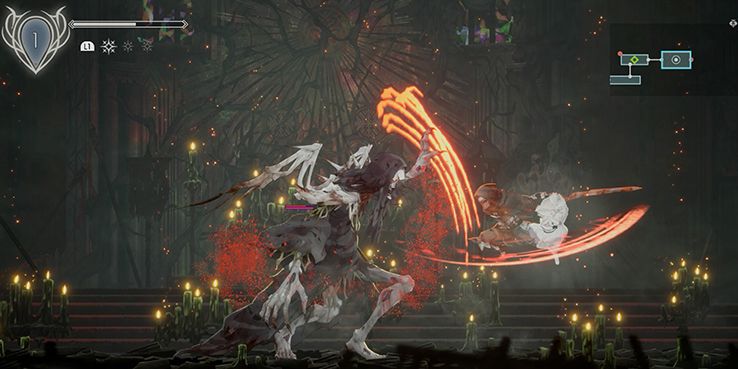
That soundtrack, composed by Japanese group Mili, enhances the moody and desolate setting established by the story and art style. At times, the low-key piano stops completely, leaving players with just ambient sounds and Lily’s footsteps. The score only ramps up slightly during Ender Lilies' boss fights to punctuate the action. However, the limited selection of songs may become tiresome for some players, although the music is mellow enough that it mostly remains in the background and doesn’t become too obtrusive.
Ender Lilies calls to mind a number of games of different genres. Most obvious will be the title’s shared roots with Metroidvania games like Hollow Knight and particularly 2019’s Bloodstained: Ritual of the Night, with which it shares gameplay elements, environments, and even enemy styles. In fact, the similarities with Bloodstained are so marked that some players may feel a sense of déjà vu.
But Ender Lilies conjures up images of NieR Replicant as well, thanks to both games’ melodic and orchestral soundtracks, and even Salt and Sanctuary or the platformer Celeste. The story of Ender Lilies is reminiscent of Dark Souls, in that a curse has fallen upon the land which causes humans to slowly lose their minds as they transform into immortal monstrosities. And enemies respawning after Lily rests seems a direct callback to FromSoftware’s bonfire mechanic.
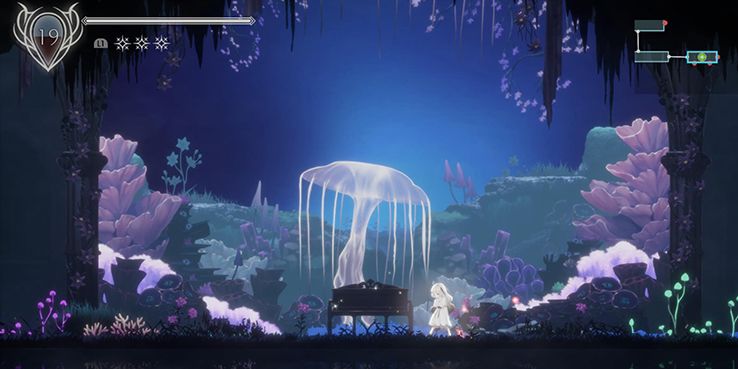
The title offers no gameplay elements that haven’t already been seen. Even the control scheme, though it feels a bit sluggish at times, will come intuitively to anybody who has played a Metroidvania game before. Players familiar with the genre will know to whack at walls to uncover hidden passageways and return to previously visited locations as new abilities are unlocked. Despite this lack of innovation, this indie game’s developers have succeeded in creating a world that is a pleasure to explore.
Likewise, the developers did a great job when designing Lily, if their intention was to evoke a feeling of attachment in the player. Many gamers will instinctively feel protective of this frail girl who is essentially defenseless on her own. She has an endearing quality, and it doesn’t hurt that she’s very cute. She never speaks and only expresses herself through gestures as she jumps, climbs, swims, and dodges her way through Land’s End.
Because Lily is a helpless child who would quickly fall if left on her own, another Priestess bestowed Lily with a guardian spirit before presumably succumbing to the Blight herself. The spirit, the Umbral Knight, will attack when and where Lily commands. This forms the foundation of Ender Lilies’ combat, a unique twist on an established mechanic that gives players motivation to progress.
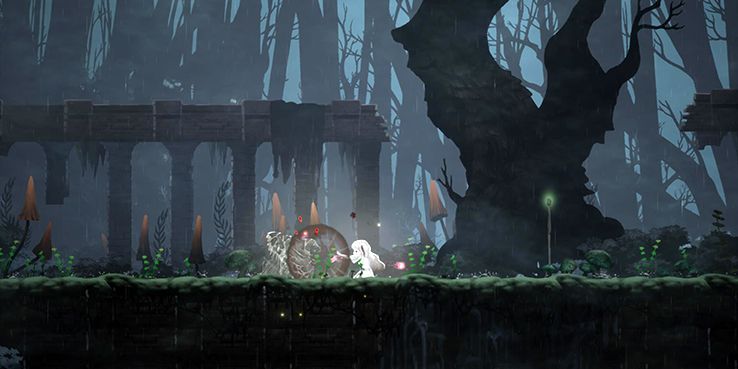
As Lily traverses the devastated land, she will inevitably encounter mini-bosses and bosses. Many of these altered creatures have sorrowful tales and wish for their existence to end, which can only come from Lily’s ability to purify their spirits. Once defeated, they leave their empty bodies behind and accompany Lily to command as needed. She can equip up to six of these spirits at a time, gaining a variety of defensive and offensive abilities. And of course some of these newly acquired skills will grant access to paths that were hitherto inaccessible.
Boss fights often come at unexpected times and will be gratifyingly difficult for those who arrive under-leveled or underprepared. While engaging, these boss battles are fairly standard, with various attacks coming at predictable intervals and a phase change after a certain amount of damage is dealt.
In general, combat will prove challenging at times, with even run-of-the-mill enemies able to cut Lily’s journey short if the player doesn’t study attack patterns and learn to dodge or parry. While one or two might be easy to tackle, Lily can easily become overwhelmed if too many enter the fray at once. Encounters are tough enough that upgrades are always welcome. These come in the form of relics in Ender Lilies, which can be equipped to gain a range of stat boosts like reduced damage taken, increased health, or an enemy stun. Items scattered throughout the land give permanent bonuses to health, can be used to enhance skills, or allow Lily to equip more relics.
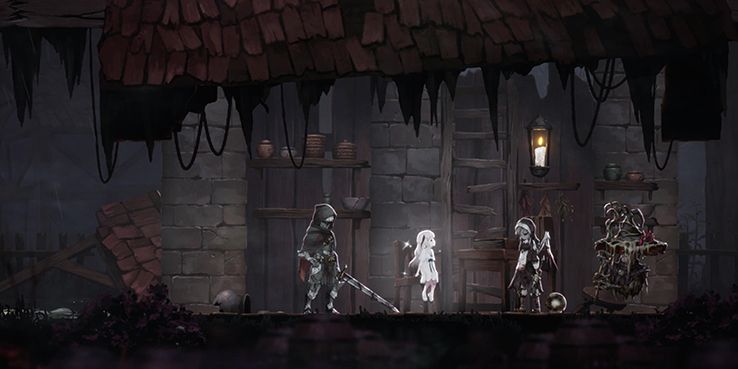
Also dispersed around Land’s End are notes, which is how the story unfolds. There is no voice acting in Ender Lilies, and so it is entirely possible to play through the game without uncovering any of the lore. However, it is lore deserving of attention, and many people may wind up playing much later into the night than anticipated, eager to uncover more of the story and expand Lily’s skillset.
While Ender Lilies may have taken inspiration from a range of titles, intentionally or otherwise, that in no way detracts from the game. The developers’ creation holds its own and is a title worthy of praise in its own right. Sure, it would be nice to have some dazzling new gameplay elements, but it’s not necessary if those that are utilized come together to form an agreeable and cohesive whole. And Ender Lilies accomplishes just that; it’s got the graphics, the music, the charismatic protagonist, upgrades to obtain, abilities to unlock, and varied environments that keep exploration compelling. Though Ender Lilies doesn’t necessarily surpass the icons of the genre that came before it, the game’s developers took a tried and true formula and replicated it well.
Ender Lilies: Quietus of the Knights is available on PC, PS4, PS5, Switch, Xbox One, and Xbox Series X/S. Game Rant was provided a code for the PS4/PS5 version.


